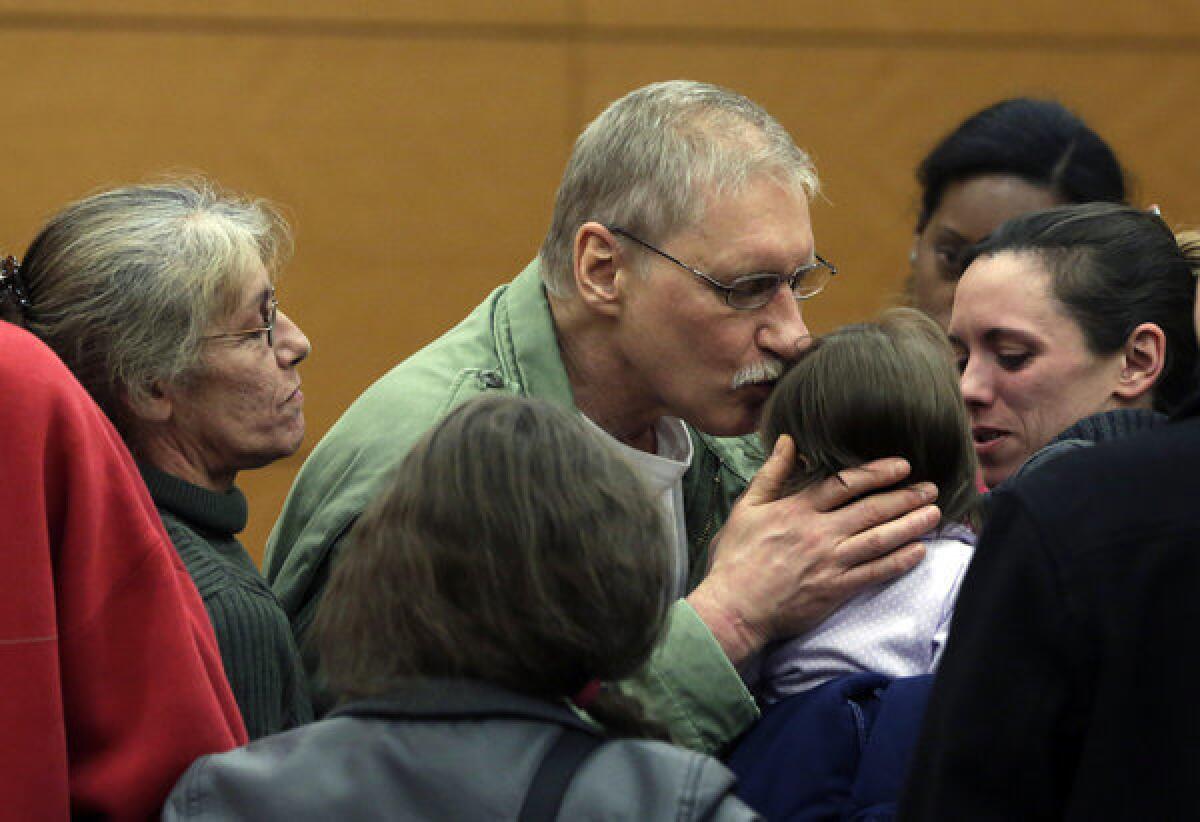Man freed after 23 years in prison, cleared of killing N.Y. rabbi

- Share via
After more than two decades in prison, David Ranta walked out of a Brooklyn courtroom a free man Thursday, no longer charged with murdering a rabbi in one of the city’s more well-known homicides.
“To say I’m sorry for what you’ve endured would be an understatement.… But I say it anyway,” Judge Miriam Cyrulnik said before releasing Ranta.
“I’m overwhelmed. I feel like I’m underwater, swimming. Like I said from the beginning, I had nothing to do with this case,” Ranta told reporters after leaving state court. He was surrounded by relatives including his pregnant daughter, who was an infant when he went to prison.
Asked by reporters what he would do next, Ranta responded: “Get the hell out of here.”
Ranta was convicted in 1991 of shooting a Satmar Hasidic rabbi, Chaskel Werzberger, in the head after the botched robbery of a jewelry courier. He twice appealed his conviction, and both times prosecutors got the courts to uphold it.
But a recent investigation by the Conviction Integrity Unit of the district attorney’s office found there were serious questions in the investigation. In backing the dismissal of the murder indictment, prosecutors said their probe showed they “no longer have sufficient evidence to prove the defendant’s guilt beyond a reasonable doubt.”
New York City in 1990 was a far different place from what it is today. For example, there were about five times as many murders that year than there were last year.
David Dinkins had just become the city’s first -- and still its only -- African American mayor. He ran on a platform of bringing all the city’s residents together after years of racial turmoil. At the time there was also an ongoing corruption scandal that had netted some of the city’s top political figures. During his campaign, Dinkins had sought the support of Brooklyn Rabbi Menachem Mendel Schneerson, the head of another ultra-Orthodox group, the Lubavitchers.
On Feb. 8, 1990, just a month after Dinkins took office, a gunman botched an attempt to rob a diamond courier in Williamsburg, a section of Brooklyn where Orthodox Jews are a key group. The courier escaped unharmed, and the assailant approached the car of Werzberger, a Holocaust survivor and a leader of the Satmar community. The assailant shot the rabbi in the head, stole the vehicle drove away.
Thousands attended the rabbi’s funeral, and Dinkins offered a $10,000 reward for information leading to an arrest in the case. After Ranta was arrested, Orthodox Jews surrounded the car that took him to jail, chanting, “Death penalty.”
There was no physical evidence linking Ranta to the case; a jury relied on witness testimony and circumstantial evidence to back a conviction. He was sentenced to 37 1/2 years in prison.
“Now you people do what you got to do, because I feel this is all a total frame setup,” Ranta said at his original sentencing, according to court documents. “When I come down on my appeal, I hope to God he brings out the truth because a lot of people are going to be ashamed of themselves.”
A witness, Menachem Lieberman, then 13 years old, testified that he had seen Ranta sitting in a car near the murder scene. In an affidavit widely reported by New York media, including the New York Times, Lieberman said police Det. Louis Scarcella took him aside and told him whom to choose.
“Before I entered” the lineup room, Lieberman said, “a police detective told me to ‘pick the guy with the big nose.’ ”
Scarcella, now retired, denied coaching any witnesses.
“I never framed anyone in my life,” he told the New York Post this week. “You have to be a low devil to frame someone. I sleep well at night.”
Who killed the rabbi remains unclear. One woman told authorities in 1996 that her husband, a cocaine addict who specialized in armed robberies, had committed the crime. Two months after the rabbi’s slaying, that man died in a car crash. His wife’s testimony was not deemed credible by prosecutors.
The case began to unravel after the district attorney’s office launched a review by its newly formed Conviction Integrity Unit in 2011. That same year, Lieberman came forward with his claim that he was told whom to pick out of the lineup. Ranta also denied he knowingly signed police file folders with statements saying he’d helped plan the robbery.
The decision to dismiss the murder indictment has not sat well with the Satmars, said Isaac Abraham, a spokesman for the close-knit community that generally shuns outsiders. Relatives believe there is credible evidence Ranta participated, he said.
“For this to happen 23 years later is mind-boggling,” Abraham told the Associated Press. “He can only claim he wasn’t the shooter, but he can never claim he wasn’t involved.”
ALSO:
Zumba prostitution promoter sentenced
Colorado to OK civil unions for same-sex couples
Westboro Baptist Church’s new neighbor: a rainbow-painted house
More to Read
Sign up for Essential California
The most important California stories and recommendations in your inbox every morning.
You may occasionally receive promotional content from the Los Angeles Times.











